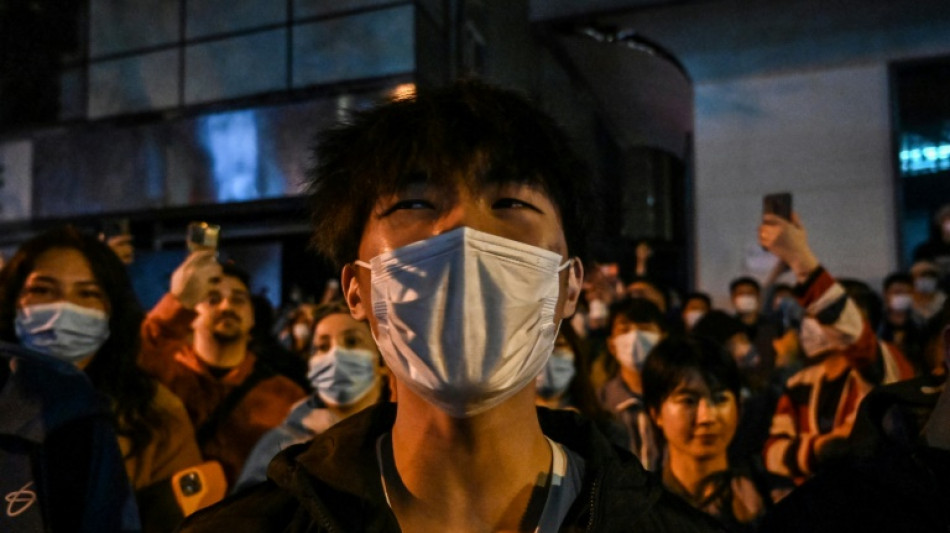
-
 BMW reports rising profitability, shares jump
BMW reports rising profitability, shares jump
-
Bolivia Supreme Court orders release of jailed ex-president Jeanine Anez
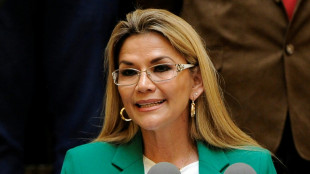
-
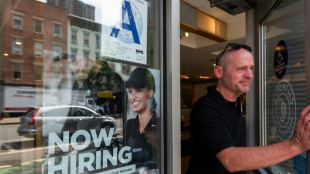 Wall Street stocks rise after positive jobs data
Wall Street stocks rise after positive jobs data
-
'Hostage diplomacy': longstanding Iran tactic presenting dilemma for West
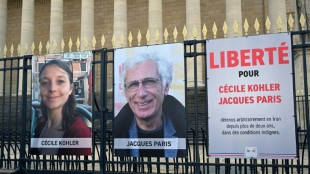
-
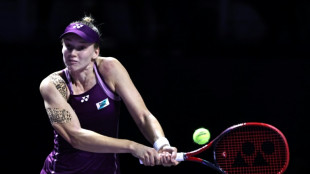 Rybakina stays perfect at WTA Finals with win over alternate Alexandrova
Rybakina stays perfect at WTA Finals with win over alternate Alexandrova
-
Le Garrec welcomes Dupont help in training for Springboks showdown

-
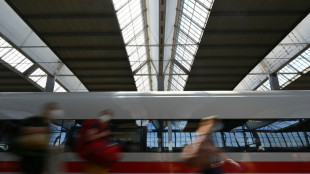 Brussels wants high-speed rail linking EU capitals by 2040
Brussels wants high-speed rail linking EU capitals by 2040
-
Swiss business chiefs met Trump on tariffs: Bern
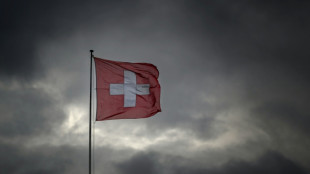
-
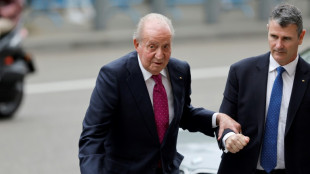 Spain's exiled king recounts history, scandals in wistful memoir
Spain's exiled king recounts history, scandals in wistful memoir
-
Wall Street stocks steady after positive jobs data
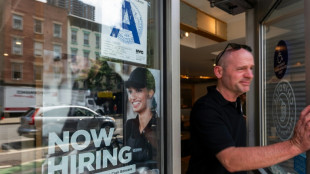
-
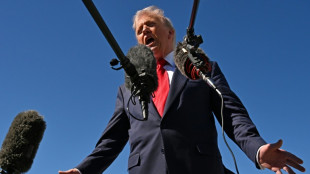 Trump blasts Democrats as government shutdown becomes longest ever
Trump blasts Democrats as government shutdown becomes longest ever
-
Indian pilgrims find 'warm welcome' in Pakistan despite tensions

-
 Inter and AC Milan complete purchase of San Siro
Inter and AC Milan complete purchase of San Siro
-
Swedish authorities inspect worksite conditions at steel startup Stegra

-
 Keys withdraws from WTA Finals with illness
Keys withdraws from WTA Finals with illness
-
Prince Harry says proud to be British despite new life in US

-
 EU strikes last-ditch deal on climate targets as COP30 looms
EU strikes last-ditch deal on climate targets as COP30 looms
-
Stocks retreat as tech bubble fears grow

-
 Shein opens first permanent store amid heavy police presence
Shein opens first permanent store amid heavy police presence
-
West Indies edge New Zealand despite Santner brilliance

-
 French pair released by Iran await return home
French pair released by Iran await return home
-
German factory orders up but outlook still muted

-
 Death toll tops 100 as Philippines digs out after typhoon
Death toll tops 100 as Philippines digs out after typhoon
-
Attack on key city in Sudan's Kordofan region kills 40: UN

-
 'No one could stop it': Sudanese describe mass rapes while fleeing El-Fasher
'No one could stop it': Sudanese describe mass rapes while fleeing El-Fasher
-
Champagne and cheers across New York as Mamdani soars to victory

-
 Medieval tower collapse adds to Italy's workplace toll
Medieval tower collapse adds to Italy's workplace toll
-
BMW boosts profitability despite China, tariff woes

-
 South Africa's Wiese wary of 'hurt' France before re-match
South Africa's Wiese wary of 'hurt' France before re-match
-
Beyond limits: Croatian freediver's breathtaking record

-
 Tottenham supporting Udogie after alleged gun threat in London
Tottenham supporting Udogie after alleged gun threat in London
-
Thunder roll Clippers to stay unbeaten as SGA keeps streak alive

-
 In appeal, Australian mushroom murderer alleges 'miscarriage of justice'
In appeal, Australian mushroom murderer alleges 'miscarriage of justice'
-
Toyota hikes profit forecasts 'despite US tariffs'

-
 Ex-France lock Willemse challenges Meafou to become 'the bully'
Ex-France lock Willemse challenges Meafou to become 'the bully'
-
Ukrainians to honour sporting dead by building country they 'died for': minister

-
 At least 7 dead after UPS cargo plane crashes near Louisville airport
At least 7 dead after UPS cargo plane crashes near Louisville airport
-
US Supreme Court hears challenge to Trump tariff powers

-
 US government shutdown becomes longest in history
US government shutdown becomes longest in history
-
India's Modi readies bellwether poll in poorest state

-
 Green goals versus growth needs: India's climate scorecard
Green goals versus growth needs: India's climate scorecard
-
Where things stand on China-US trade after Trump and Xi talk

-
 Sri Lanka targets big fish in anti-corruption push
Sri Lanka targets big fish in anti-corruption push
-
NY elects leftist mayor on big election night for Democrats

-
 Injured Jordie Barrett to miss rest of All Blacks tour
Injured Jordie Barrett to miss rest of All Blacks tour
-
Asian markets tumble as tech bubble fears grow

-
 Pay to protect: Brazil pitches new forest fund at COP30
Pay to protect: Brazil pitches new forest fund at COP30
-
Iraq's social media mercenaries dying for Russia

-
 Young leftist Trump foe elected New York mayor
Young leftist Trump foe elected New York mayor
-
Concerns at ILO over expected appointment of close Trump advisor


China protests speak to deep political frustrations
Protests spreading in China have been catalysed by fury at the government's hardline zero-Covid policies but have also exposed deep-rooted frustration against the country's wider political system.
People took to the streets across China on Sunday to call for an end to lockdowns and for greater political freedoms, in a wave of widespread protest not seen since pro-democracy rallies in 1989.
A deadly fire last week in Urumqi, the capital of northwest China's Xinjiang region, sparked public anger, with many blaming Covid-19 lockdowns for hampering rescue efforts.
China remains the only major economy with a strict zero-Covid policy, with local authorities clamping down on even small outbreaks with strict lockdowns, mass testing campaigns, and lengthy quarantines.
While many had expected the policy to be relaxed after the ruling Communist Party's five-yearly congress last month, Beijing instead doubled down. That fuelled the public rage now playing out on the streets of some of China's biggest cities.
"People have now reached a boiling point because there has been no clear path to end the zero-Covid policy," Alfred Wu Muluan, a Chinese politics expert at the National University of Singapore (NUS), told AFP.
Yasheng Huang, a professor at MIT, said on Twitter the party's new top leadership comprised of Xi Jinping loyalists was committed to zero-Covid.
"Before the 20th Congress there was hope of policy change, but the leadership lineup of the Congress completely derailed this expectation, forcing people to take actions into their own hands," Huang said.
- 'Freedom to write!' -
Anger over Covid lockdowns has also transformed into calls for broader political change, with some in Shanghai early on Sunday even chanting "Xi Jinping, step down! CCP, step down!"
Students protesting at Beijing's elite Tsinghua University on Sunday chanted "democracy and the rule of law, freedom of expression".
And demonstrators in Beijing on Sunday night shouted slogans demanding "freedom of art" and "freedom to write!"
Demonstrators across China have also held up blank sheets of paper symbolising censorship.
"I don't recall public protests directly calling for press freedom in the past two decades," political scientist Maria Repnikova said in a tweet.
"What is very intriguing about these protests is how single-issue focus on #covidlockdown quickly transpired into wider political issues," she said.
Largely young and social media savvy, protesters have organised on the web and used canny tricks to protest against state censorship -- from holding up blank papers to online articles consisting of nonsense combinations of "positive" words to draw attention to the lack of free speech.
"The protesters are very young, and anger from the bottom is very, very strong," the NUS's Wu said.
- Scale and intensity -
What will particularly spook the party's leadership, analysts said, is the protesters' rage at China's top brass. This, they argue, is unprecedented since the pro-democracy rallies in 1989 that were ruthlessly crushed.
"In terms of both the scale and intensity, this is the single largest protest by young people in China since the student movement in 1989," Willy Wo-Lap Lam, Senior Fellow at The Jamestown Foundation, told AFP.
"In 1989, students were very careful not to attack the party leadership by name. This time they have been very specific (about wanting a) change in leadership."
The scope of the protests -- from elite universities in Beijing to central Chinese cities such as Wuhan and Chengdu -- is notable, Lam said.
Other analysts cautioned against comparisons to the bloody events of 1989.
"There may not be overarching demand for political reform beyond ending zero-Covid," Chenchen Zhang, an assistant professor at Durham University, tweeted. "The urban youth today grew up with economic growth, social media, globalised popular culture."
"The past should not limit our imagination."
- 'Anger is very strong' -
Rare public protests in China are typically focused on local officials and firms, with Beijing "cast in a benevolent light to come in and rescue people from local corruption", said one expert.
"In these protests, the central government is now being targeted because people understand that zero-Covid is a central policy," Mary Gallagher, Director of the Center for Chinese Studies at the University of Michigan, told AFP.
Experts were divided on whether Beijing will respond with the carrot or the stick.
"Anger is very strong, but you can't arrest everyone," Wu said.
Peter Frankopan, Professor of Global History at Oxford University, described the role of police as delicate.
"There will be considerable sympathy, especially with younger officers, for the protesters. So giving the order to crackdown brings risks too," he told AFP.
The leadership will likely be forced to confront the unrest publicly.
"Xi or other top-level leaders will have to come out sooner or later. If not, there is a risk that the protests would continue later," Lam said.
With the protests entering their third day, experts said it was likely the rallies would continue.
"It seems to me that the discontent is rising, rather than falling," Frankopan said.
K.Thomson--BTB




